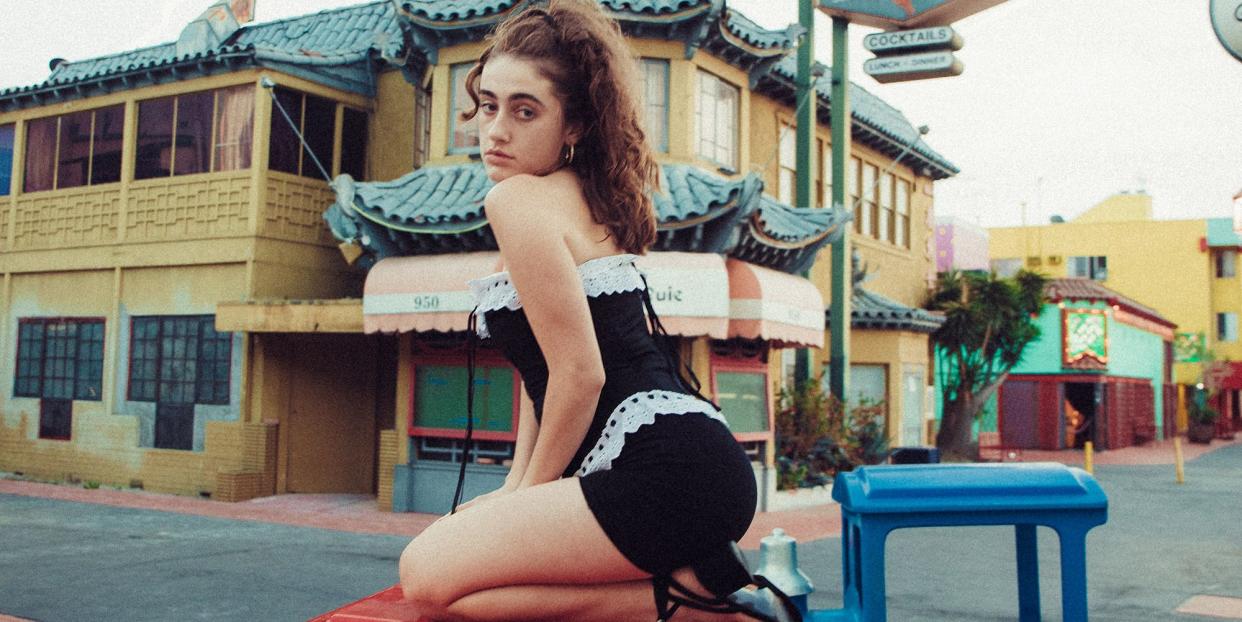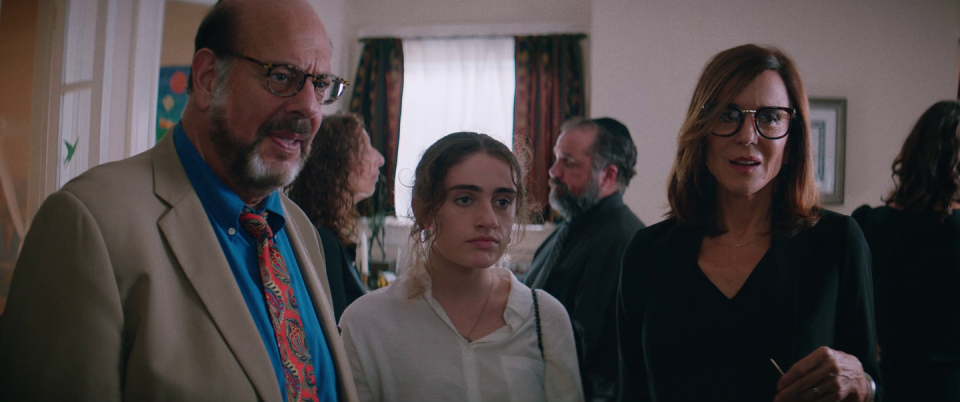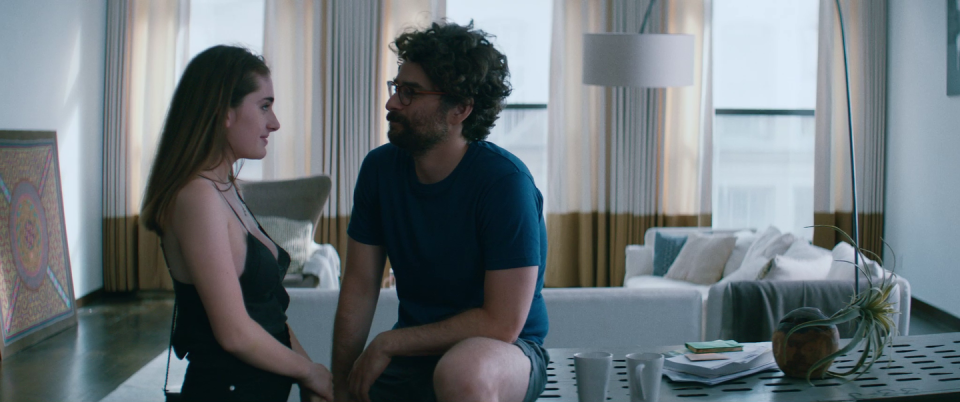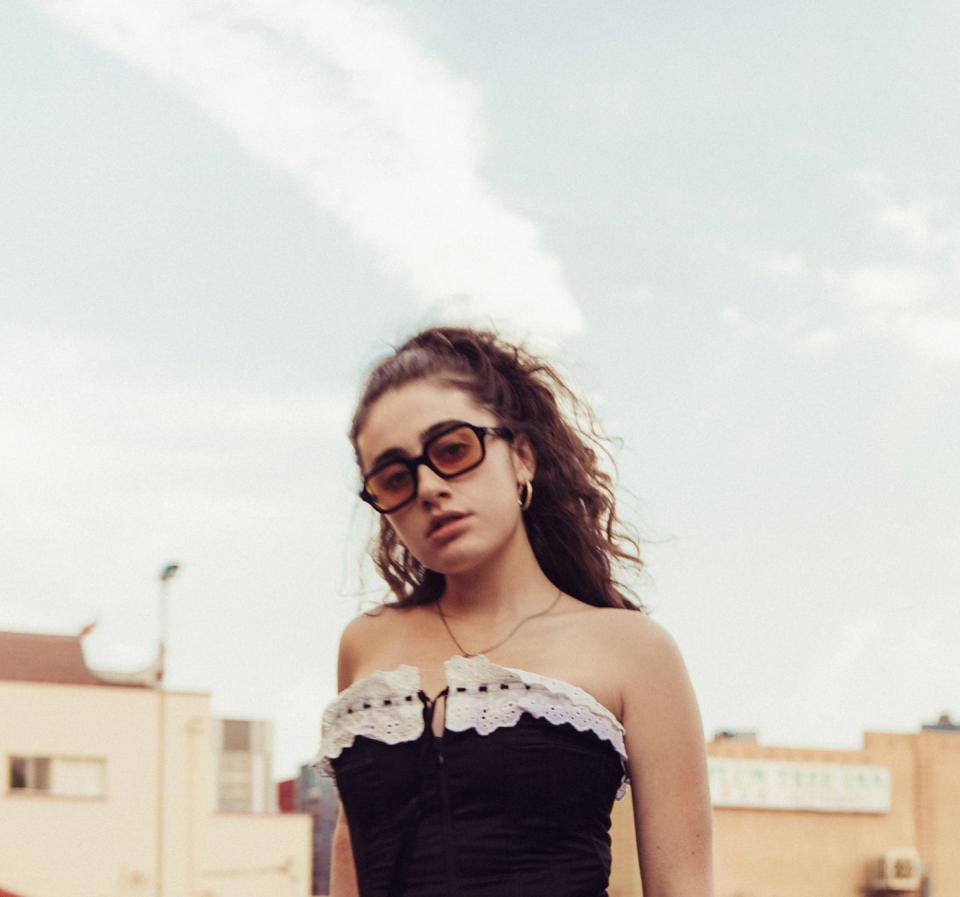Rachel Sennott on the Relatable Horror of ‘Shiva Baby’ and the Secrets of Her Bagel & Schmear Dress

- Oops!Something went wrong.Please try again later.
- Oops!Something went wrong.Please try again later.
Imagine you’re at a shiva and your sugar daddy and ex-girlfriend are there. Then, add your parents, the sugar daddy’s wife, judgmental neighbors who vaguely know you, and a heaping serving of anxiety. That’s Shiva Baby, a suspenseful comedy following a bisexual 20-something Jewish woman, Danielle (Rachel Sennott), trapped at a shiva where she’s plagued by questions about her career prospects and the haunting presence of current and former lovers. A series of lies, unexpected guests, and nowhere to go quickly turn Danielle’s fragile psyche and double life into a pressure cooker.
For Shiva Baby, Sennott was already familiar with the Danielle: She played the character in a 2018 short film, also written and directed by Emma Seligman. “I was a little scared right before we shot the first scene of the feature. I was like, ‘What if I forgot how to do this?’” Sennott tells ELLE.com over the phone.
After attending NYU and cutting her teeth in New York City’s stand-up scene, the 25-year-old actress and comedian padded her resume with an extremely engaged internet presence (with an emphasis on millennial dating qualms) and roles in HBO’s High Maintenance and her own original shorts. While she focuses on promoting Shiva Baby, Sennott is also starring in the ABC comedy series Call Your Mother.
In a recent interview, the actress and comedian spoke to ELLE about wearing a bagel and schmear dress, the complexities of Danielle, and why Shiva Baby feels like a horror movie.
How did you approach playing Danielle?
[Emma and I] were writing this other script, and we would just go on walks and talk about Danielle’s journey, and then where we were in our lives. I had this base of connection to [the character] just from that time. We charted what level of anxiety she got, and then we wrote in each theme who has the power: sometimes Max has the power, sometimes Danielle has the power. Maya, I feel, is in the most control of herself. That was really helpful, to have the shifting dynamics of that. That motivates the things Danielle does. She goes from being like, Oh, I don’t really want to be here. I’m going to get through this day to obviously being like, I need to survive and get out of this without people finding out all of my shit. The arc of that, combined with the power and the anxiety, really helped me in playing the role.
As a Jewish woman, I could relate to a lot of the family moments at the shiva, but they could certainly apply to a lot of people’s family interactions. Were you able to bring any of your own experiences to the role?
Totally. I actually talked to Emma about this when I first auditioned for the short film, and she’s obviously writing from her background and her family perspective. I come from a really big, Italian, Irish Catholic family, and obviously, it’s a different experience, but I do feel like I had a lot of crossover with the nitpicking relatives—everybody’s in your business—and the food stuff. With my family, half of the time it’s like, “You’re too skinny. Now you're eating too little.” Back and forth, back and forth. The loving criticism, too, is something I really related to in the script. And where Danielle was in her journey: When we shot the movie, I had just graduated, I went to school for acting, and everyone in my family was like, “So, what’s going on with your Twitter?” When I was first doing stand-up, I felt the same as Danielle—her whole family loves her, but there's a little bit of that edge of, “What’s she doing? What's going on?”

Did any of your personal romantic relationships parallel Danielle’s entanglements?
Throughout college and after college, I dated people where I felt like there was a big power play. I felt like I was in control, and then as soon as I wanted to be in a relationship with them, they would be like, “no,” and then I felt like I lost all the power. It was all about proving you cared less. That was all of my relationships or dating [situations] from college until literally a couple of months ago. It really was so much time to be like, “I care less than you care” to maintain power in the relationship and not get hurt. That’s something Danielle is doing in her relationship with Max. I really connect to that because you don’t want to get fucked over. You don’t want to care about someone and have them not care about you.
How much did you know about sugar babies before taking on the role?
Well, a lot of [mine and Emma’s] friends sugared. I think NYU is the top school for it. New York is expensive and NYU is very expensive, so it makes sense. We had experience talking to our friends who did it. There’s such a range, too. The way it’s portrayed sometimes in TV is very sexy or [that there’s] just one version of it, and Emma was able to write a really nuanced experience that I haven’t seen a lot—like a non-sexy, non-glamorous version.
I thought the sugar daddy [Danny Deferrari] would be way older.
There is such a range of ages. It’s interesting, too, because he has a wife who’s so successful, beautiful and talented—and a baby. [Max] doesn't feel powerful in his relationship because his wife is more successful than him, so he has to cosplay as this really successful guy because he feels insecure in his own marriage.

If you were a sugar baby, what would you want from your sugar daddy?
I would want an experience of going into a different world, like if he was an elite banker. Experiencing his world would be really interesting.
The poster for Shiva Baby was pretty epic. You got to wear a giant dress made of cream cheese and bagels. Tell me about that look.
That was literally shaving cream. A bunch of people came together to make the poster happen. Our distributors wanted to do something different than taking a still from the movie. It was so fun. They created the base of the dress [with] shaving cream and bagels. There was one girl who was literally on bagel duty because they kept sliding down the dress, and she would be lifting them up as we went. And then on top, they covered me in shaving cream, and I just sat there. If I moved my arm down, I got shaving cream on them, so it was very posed. It smelled good too, honestly. It was weird sitting there and not being able to eat [the bagels], but they kept adding more.
Danielle is constantly stress-eating during the movie. How many bagels did you have to eat during the filming?
Cookies, too! The scene outside, I literally run into [it] eating a cookie, so before we kiss, every time, I was trying to swallow it. I definitely had hundreds of bites. They would give me a spit bucket, but you’ve already chewed it, and I’m not gonna not eat this. That ended up being a very cumulative amount.
The combination of the movie’s score and the way it was shot made Shiva Baby feel like it was going to turn into a horror movie. Was that the goal?
Ariel Marx, who did the score, is so talented [and] added such an intense layer to the anxiety. Emma and I were in L.A. together last year in January to do meetings, and every time she would be in the Uber in between, she would be listening to the score on her headphones, and would be like, “It needs to be scarier.” I think that's part of her vision of wanting it to be this big anxiety ride. I’ve seen some people talking about the movie telling [Danielle] to leave the house, leave the shiva, but you can’t because of the social construct. That score helps show that Danielle’s in her own horror movie, while everyone else isn’t, but for her personally, it is. It’s this rollercoaster she can’t get off.

You can really feel Danielle’s anxiety. Did your own experiences with anxiety inform how you portrayed it onscreen?
What's interesting is that I always have anxiety about things, [and] I’ve been working on DBT. The things that I get anxious about are not based in reality. Pre-pandemic, I go to drinks with my friends, we have a great time [and] it’s my best friends who love me. The next day, I wake up, and I [panic that I] said something wrong, everything’s falling apart, and everyone hates me. Danielle is already an anxious person, but there’s things to be stressed about that day. She’s not crazy to be really anxious, but what I took from it is that thing where your mind is in a completely different place of running in circles of what’s the worst-case scenario of what can happen here? That’s where my mind always goes.
Danielle is wearing so many masks at the shiva. Did you feel like you were playing multiple characters all at once?
Definitely. “I was raised pretty religious…then I got to college, and everyone was like, ‘Be a slut and cancel your family.’” When I went home for the first time, I felt these two different versions of myself fighting against each other. I think [Danielle] has the version of herself that she plays when she’s with Max, which isn’t even the real her, but she enjoys playing that. And then she plays [a version] for parents, the relatives, and with Maya. So I feel like she almost gets whiplash because she’s trying to cover all her bases.
One of the most striking scenes, and the turning point of the film, is when Kim [Dianna Agron] keeps asking Danielle to hold her baby. Danielle proceeds to knock down all the prayer books and collapses on the floor kissing them. What was the meaning behind that scene?
Kim is basically showing her the cost of her choices: We have a baby, we have a family. Danielle is feeling the guilt, the panic and everything at once, and literally does not want to take on holding the baby. It also feels like she’s the sacrifice because everyone is watching this interaction. She pays the price even though Max is the antagonist. If that didn’t happen, I don’t know if Danielle would change her behavior. It’s a coming-of-age story in one day: She has to make a change because of that moment with Kim and the baby and everybody looking at her. Obviously, her life isn’t gonna be perfect the next day, but I think it changes her course.
Did you know Emma before you did the short film version of Shiva Baby?
I met her when I auditioned for the short film. When I was at NYU, they do senior student thesis films, which are five- to 10-minute shorts, and I was not really into the plays that the theater program did—they were all very serious, very depressing. It wasn't for me. So I started doing all the thesis films, and Emma saw me in another student’s thesis film. One of the producers reached out to me to audition, and that was the first time we met. Then, through doing the short and writing another movie, we became best friends and kept working on things together.
Why is this story so important for bisexual and Jewish representation?
Emma wrote a script with such a nuanced depiction of what it’s like to be a bisexual Jewish woman and what it’s like when different parts of her identity clash. The film really highlights the balancing act young women have to manage trying to fit into the different boxes their parents, family, extended family, friends, and society have for them.
You Might Also Like

